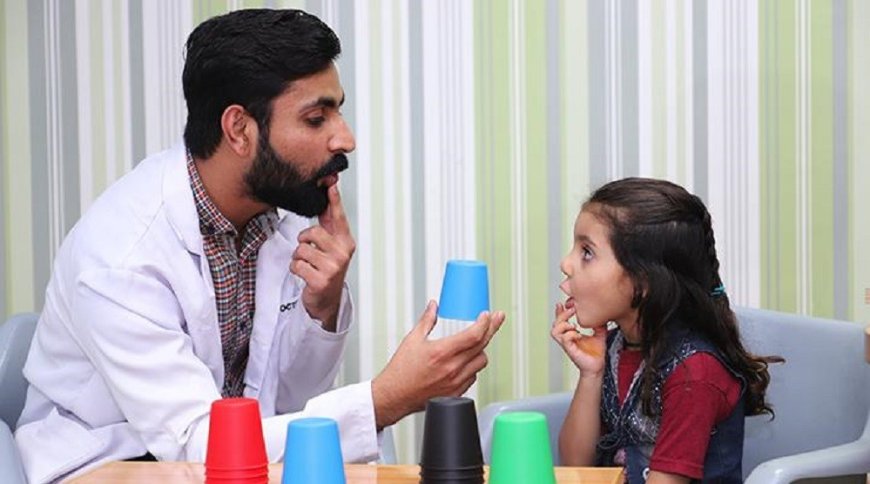Which speech problems will disappear and which require a speech therapy consultation?
does not require a visit to a speech therapy. You can count on your speech problems to go away by themselves with age. Sometimes,

Sometimes incorrect pronunciation of a child is a normal stage of his speech development and does not require a visit to a speech therapy. You can count on your speech problems to go away by themselves with age. Sometimes, however, consultation with a specialist is necessary. Which speech problems will pass by and which ones require the help of a speech therapist?
Some of the child's speech problems are not defects, but only the natural development of their speech. Simply put - at a certain age, a child can do something and has not mastered something yet. Nevertheless, you need to be vigilant, because sometimes the problem does not pass with age and then it requires the support of a speech therapist. When to go to a speech therapist? Which speech problems will disappear and which require a speech therapy consultation?
Table of Contents
- Learning to speak is a process
- How should a child of a certain age speak?
- When can we assume that the defect will not go away by itself?
Learning to speak is a process
A child's development can be described as the cyclical acquisition of skills in specific spheres. One of the abilities that a child develops in the course of development is speech. In order for it to be understandable to the environment, the child must have the ability to effectively pronounce sounds, syllables, words from which he can create sentences and longer forms of expression.
In a situation where a child does not pronounce the sounds correctly, changes them into other sounds, or certain sounds do not appear in their everyday speech, it is possible to suspect that they are incorrect, a "speech impediment"
However, it is worth considering whether improper pronunciation of speech sounds is always a cause for concern and is considered a disadvantage?
How should a child of a certain age speak?
When answering the above question, there are several factors to consider - including the child's age, and the exact characteristics of the abnormality. This is important from the point of view of the adopted developmental norms, which indicate what a given child should be able to pronounce at a certain age.
So what should a 3-year-old, 4-year-old, 5-, 6-, 7-year-old child's pronunciation look like and what does it depend on? The ability to pronounce largely depends on the maturity of the articulation organs, or more precisely, on their motor skills (movement). The maturity of the articulators is shaped over months and years.
Must Read: What are interpersonal relationships?
Therefore, the child is not able to pronounce all the sounds at once, as they require precise movements of the lips, tongue, palate and cheeks. The pronunciation assessment also takes into account the condition of the dentition, occlusal conditions and hearing.
- A child of 3 years old should pronounce correctly:
At this age, the child should be able to create words and short sentences using the above sounds correctly pronounced. In the case of other sounds of the Polish language, there may be deviations from the norm, e.g. omitting some letters in a word.
- A child of 4 years old should pronounce correctly:
At this age, the child, in relation to the 3-year-old, acquires the ability to pronounce the so-called anterior linguistic sounds. As at the age of three, so it is worth carefully observing the child's pronunciation and considering a visit to a speech therapist.
- A child of 5 years old should pronounce correctly:
At this age, the child should pronounce almost all the sounds. A five-year-old can still replace developmental norm with the correct pronunciation of the other sounds. In addition, a five-year-old child already has significant lexis, grammar and syntax skills. Sentences become more and more complex and there are fewer grammatical errors.
- A child of 6-7 years old should pronounce correctly:
At this age, the child is able to pronounce all the sounds of the language correctly. Then the most difficult sound appears. The correct pronunciation of the sound should appear up to 7 years of age (usually around the age of 6).
A child between the ages of six and seven should not replace certain sounds with other sounds and omit them, or rearrange their places in words. In addition, the vocabulary is already extensive and the sentences remain mostly grammatically correct and extensive.
When can we assume that the defect will not go away by itself?
The above guidelines indicate what sounds and when the child should pronounce and when it can be considered that the lack of a given skill is age appropriate and does not require specialist action.
Unfortunately, in some cases the phenomenon of "deformation" occurs. This means that a given sound is pronounced in isolation, in a syllable or in a word that is distorted. A case that can illustrate this phenomenon is the so-called "interdental" pronunciation, in which the child pronounces a sound with a tongue between the upper and lower teeth.
The deformed pronunciation often also applies in a specific way, which cannot be assigned to the sound of another phone. Incorrect pronunciation is also sometimes caused by anatomical defects in the oral cavity, hearing disorders.
To sum up, abnormalities, such as deformities, can affect all sounds. Such a situation always requires a speech therapist as such speech impediments are not able to disappear on their own. On the other hand, you should definitely not worry if a four-year-old or even a five-year-old does not pronounce the sound is pronounced e.g. deformation).
